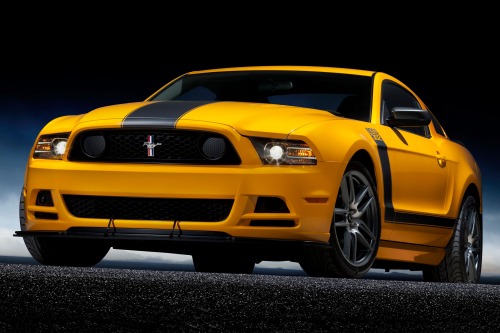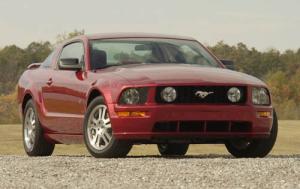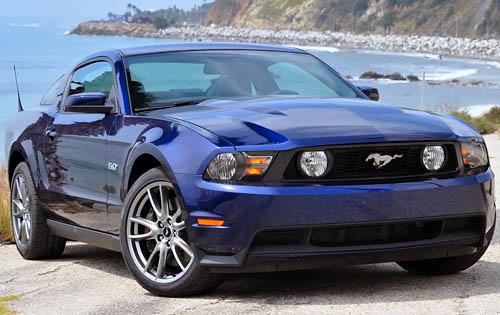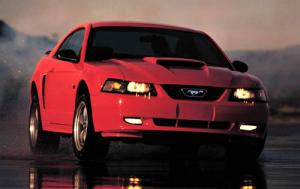While historically high new and used car prices have forced buyers to look for "older" vehicles that may have aged well as a way of saving money, the issues of reliability and dependability have become even more crucial.

And generally speaking, older Ford Mustangs have done well in terms of long-term reliability overall. In fact, an older Mustang can be expected to last in the 200,000 miles range if well-maintained, and some much further. And that's the key - "well-maintained".
So here, ...
- We'll do an overview of the earlier Mustang generations.
- And follow that with each generation's reputation for reliability.
- Then we'll list possible mechanical issues that have been reported by some owners so they can be checked before buying one today.
- And then summarize the overall pros and cons of an older Mustang worth consideration.
But first, and very importantly ...
Things To Do When Considering An "Older" Vehicle
Locate Lower Mileage Vehicles: They are certainly out there to be found with careful and patient shopping. Be willing to drive a distance if you have to.
Vehicle History and Maintenance: Ask for the vehicle history report (CarFax or AutoCheck) as well as documented maintenance and repair records. If not provided by the Dealer or private seller, it's usually best to move on.
Pre-Purchase Inspection: Have the vehicle independently inspected before making a final decision. This usually will cost in the $150-$200 range but is well worth it given the potentially thousands in savings over the long term.
Also, Always Know The Value Of Your Trade-In!
Whether you are trading or selling on your own, it's just a good idea ... even whether you are in the market or not at the moment. You can then use this important information for a number of purposes ... to negotiate with a dealer, or to know how to price your car in the retail market, or simply to know the value of one of your assets, which is always a good idea.
Getting trade-in values online tend to vary a lot from site to site. But I've found the one at Edmunds Trade-In Quotes is particularly comprehensive and accurate.
It's free, it's quick and there's no contact by any third parties. I think what helps its accuracy is the inputs will include either your plate# or VIN#. They really focus in on the specific vehicle.
Ford Mustang Fifth Generation (2005 - 2014)

With the coming of the 5th generation in 2005, "value" remained one of the Mustang's key draws. And the redesign brought back images of the old Mustang styles of the 60's.
This completely redesigned Mustang adopted an all-new chassis following 25 years of the Fox-body platform. This run was marked by significantly improved ride quality and more precise handling while it still employed a fairly basic solid-axle rear suspension and rear-wheel drive. On the downside, the interior's materials quality remained subpar.
For those who find the standard Mustang coupe or convertible too tame ( it came with a not parrticularly impressive 4.0-liter V6 generating 210 horsepower and 240 lb-ft of torque), you can opt for the GT convertible or coupe with its 300-horsepower 4.6-liter V8 with 320 lb-ft.
Of course, there's also the Shelby GT500 (brought back in the 2007 model year) with its supercharged 500-horsepower 5.4-liter V8.
The model lineup started off with V6 Deluxe, V6 Premium, GT Deluxe and GT Premium trims. Standard features on the base V6 Deluxe included full power accessories, air-conditioning, a CD player, keyless entry, 16-inch alloy wheels and cruise control, while the V6 Premium added a power driver seat, upgraded wheels, a 500-watt Shaker 500 audio system and a leather interior on convertible models.
The GT Deluxe added on to the V6 Deluxe's features with sport seats, 17-inch alloy wheels, antilock brakes, 17-inch alloy wheels, a leather-wrapped steering wheel and dual front power seats, while the GT Premium added to the V6 Premium's features with the leather upholstery and the Shaker 500 audio system.
Annual Updates
Some of the more significant updates during this production run included the addition of navigation, satellite radio and an auxiliary audio jack for the 2007 model year. 2008 saw side airbags become standard as well as the introduction of the Mustang Bullitt with its firmer suspension tunings, a 315-horsepower V8, high-performance brakes and 18-inch wheels. For 2009, satellite radio became standard and a glass roof became optional.
There were also some significant revisions made in the 2010 model year. This version, while still strongly related to its predecessor, included improved handling, a higher-quality cabin, a more aggressive-looking design, standard stability control and new available features such as a rearview camera and Ford's Sync system.

In 2010, powering the Mustang was either the previous 210-horsepower 4.0-liter V6 or an updated 315-horsepower 4.6-liter V8. These engines were changed for 2011 when the current 305-horsepower 3.7-liter V6 and 412-horsepower 5.0-liter V8 debuted. 2011 also saw the Mustang get bigger brakes, a revised suspension and a firmer structure for the GT convertible, making 2011 and newer Mustangs the more preferable choice for many.
Changes for 2012 included the reintroduction of the iconic and high-performance Boss 302 model with a 444-horsepower V8, while the GT offered adjustable power steering settings.
Standard equipment on the base V6 include such features as full power accessories, air-conditioning, 17-inch alloy wheels, air-conditioning and an audio system with a CD player and auxiliary audio jack. The V6 Premium goes on to add a power driver seat, a leather interior, Sync and an upgraded audio system with an iPod/USB interface and satellite radio.
The base GT comes much like the V6, but adds the V8 engine, a rear spoiler, adjustable steering effort, 18-inch alloys and automatic headlights, while the GT Premium mirrors the V6 Premium's equipment. Some of these models can also be found with optional features such as Recaro seats and a Track Pack for manual-transmission GT models that includes a limited-slip Torsen differential, a 3.73 rear axle ratio and performance brake pads.
Car Buying Tips:
Do This For The Best Trade-In Price
How To Get The Lowest Rate Car Loan
The performance-oriented Boss 302 is coupe only. In addition to the more powerful V8 engine, it also comes standard with Brembo brakes, adjustable shock absorbers, quad exhaust tips, a 3.73:1 rear-axle ratio, 19-inch wheels, alloy pedals, unique exterior trim and aerodynamic features, special interior trim, a suede-wrapped steering wheel, cloth seats and the base stereo system.
There's also a limited-edition Boss 302 Laguna Seca model that comes with a stiffer suspension, race-compound tires, still more aerodynamic enhancements, the Recaro seats, the Torsen differential, special gauges and the elimination of the rear seat.
2005 - 2014 Ford Mustang Reliability
Overall, the fifth-generation Ford Mustang has been generally considered to be more reliable compared to earlier generations, with fewer reported mechanical problems. However, as with any mass-produced vehicle, there were still reports of occasional issues.
Many owners found them to be dependable when properly maintained, and the engines, both the V6 and V8, have been generally robust and offered good longevity if maintained regularly.
Regular maintenance, including oil changes, fluid checks, and addressing any warning signs promptly, played a significant role in maintaining reliability. not surprisingly, those who followed the manufacturer's recommended service schedule tended to have better experiences with reliability.
That said, there were still reported issues with components such as transmissions, suspension parts, and occasional electrical glitches. While not widespread, these problems were present in some vehicles and could impact reliability for those specific cars.
2005 - 2014 Mustang Possible Mechanical Problems
The fifth-generation Ford Mustang generally had fewer reported mechanical issues compared to earlier generations. However, some problems were still noted by owners and mechanics:
Transmission Issues: Some models, especially earlier versions, experienced problems with manual transmissions, including issues with synchros causing gear grinding or difficulty shifting. Automatic transmissions might have occasional shift quality problems or torque converter issues.
Engine Problems: While the engines themselves were generally reliable, there were occasional reports of oil leaks, especially in higher-mileage or older models. Some V8 engines had issues with cam phasers or timing chain tensioners.
Suspension and Steering Components: Components like ball joints, control arms, and tie rods might wear out, leading to noises, vibrations, or handling issues. Power steering systems might develop leaks or experience pump failures.
Electrical Gremlins: Some owners reported sporadic electrical issues, such as problems with the power windows, door locks, or interior electronics.
Cooling System: As in previous generations, there were occasional reports of cooling system issues, such as radiator leaks, water pump failures, or thermostat malfunctions leading to overheating.
Exhaust System Rust: Some owners reported premature rusting of exhaust components, especially in regions with harsh climates or where roads are salted in winter.
It's important to note that while these problems were reported by some owners, not every vehicle experienced these issues. Regular maintenance, including timely oil changes, fluid checks, and addressing any warning signs promptly, often helped mitigate these problems.
Ford Mustang Fourth Generation (1999 - 2004)

This generation offered an excellent mix of fun, performance and affordablility, and are very likely the best of the Fox-body-based Mustangs (produced since the 1970's and ending in 2004). On the negative side, however, would be an aged platform which resulted in some unrefined handling issues along with some lower-grade interior materials.
During this production run, Base, Deluxe and Premium models came with a V6 engine, while the GT Deluxe, GT Premium and Mach 1 were equipped with a V8. Convertible models came in Deluxe and Premium regular and GT versions.
Typical standard features on the base model included full power accessories, air-conditioning, 16-inch wheels and a CD player. The Deluxe trim added cruise control, a power driver seat and a spoiler (on the coupes), while the GT Deluxe added an upgraded suspension, a limited-slip differential, sport seats and 17-inch wheels.
The Premium models went on to add a leather interior and an upgraded audio system with a CD changer, while The Mach 1, which was limited in production, included a shaker hood with a ram-air scoop, unique alloy wheels, a lowered and revised sport suspension, upgraded brakes, special alloy wheels and unique interior and exterior trim accents.
Older Mustang shoppers should also note that some Premium models can be found with the 40th Anniversary Package which featured either a red, black or white exterior, unique Arizona Beige wheels, embroidered floor mats, a more-insulated top on convertibles and brushed aluminum pedals (it dropped the rear spoiler on coupes).
Our favorite in this group would be the GT with its very healthy 260-horsepower V8. But if you're interested in something both faster and more unique, you may want to consider the limited edition Mach 1 with its 305-horsepower V8 ... or the supercharged SVT Cobra with a 390-horsepower V8.
Both of these were produced in 2003 and 2004 and can be a bit challenging to find, although a little patience can be well worth it.
1999 - 2004 Ford Mustang Reliability
The reliability of the fourth-generation Ford Mustang varied based on several factors including maintenance and driving habits. Generally, these Mustangs were known for being relatively reliable, but they did have their share of issues, as is common with any vehicle.
The V6 engines in these models were generally more straightforward and had fewer reported problems compared to the higher-performance V8 variants. With proper maintenance and care, many owners experienced decent reliability from these vehicles.
However, as with any older car, some have developed issues over time, especially if they were not properly maintained or if they had high mileage. Ultimately, while some owners reported high reliability and satisfaction with their fourth-gen Mustangs, others experienced more problems.
1999 - 2004 Mustang Possible Mechanical Problems
The fourth-generation Mustangs had some common mechanical issues reported by owners and mechanics. Some of the more prevalent problems include:
Transmission Issues: The manual transmissions in some models were known to have problems with synchros, leading to gear grinding or difficulty in shifting. Automatic transmissions might suffer from torque converter or valve body issues.
Suspension Components: Bushings, ball joints, and other suspension components could wear out, leading to squeaks, rattles, or clunks in the suspension.
Electrical Problems: Some owners reported issues with electrical systems, such as faulty wiring causing intermittent problems with lights, power windows, or other accessories.
Cooling System: Overheating problems were occasionally reported due to issues with the cooling system, such as radiator leaks, water pump failures, or thermostat malfunctions.
Engine Problems: While the engines themselves were generally robust, some V8 models (especially the earlier ones) experienced problems like oil leaks, gasket issues, or occasional valve train problems.
Rust: In certain climates or if not properly cared for, these Mustangs could be prone to rust, especially in areas like the undercarriage or around the wheel wells.
Overall Pros And Cons Of An Older Ford Mustang
Older Ford Mustang Pros
Classic Design: Older Mustangs have a timeless design that many enthusiasts appreciate. Its muscular appearance and iconic pony car styling still turn heads.
Affordability: Compared to newer models or even some older classics, these Mustangs can be relatively affordable to purchase. They offer a good balance between price and performance.
Aftermarket Support: There's a thriving aftermarket community for these Mustangs. This means plenty of available parts, modifications, and upgrades to personalize and enhance your car.
V8 Engines: Some models come equipped with V8 engines (GT and Cobra variants), offering impressive power and a classic V8 soundtrack.
Driving Experience: They can provide a raw and engaging driving experience, especially if you enjoy the feel of a rear-wheel-drive, naturally aspirated sports car.
Older Ford Mustang Cons
Aging Technology: The technology and features in these models might feel outdated compared to newer cars. This includes interior amenities, safety features, and infotainment systems.
Reliability Concerns: With older vehicles, there's always a risk of mechanical issues or wear and tear, especially if the car hasn’t been properly maintained or if it has high mileage.
Fuel Efficiency: V8 engines, while powerful, tend to consume more fuel compared to smaller, modern engines. This could impact your fuel costs if you plan on using it as a daily driver.
Ride Comfort: Some owners find the ride quality to be a bit harsh or less refined compared to newer models or other cars in its class.
Limited Safety Features: Older models will lack some of the advanced safety features that are standard in newer cars, which could be a concern for safety-minded buyers.
 By Josh Rosenberg
By Josh Rosenberg